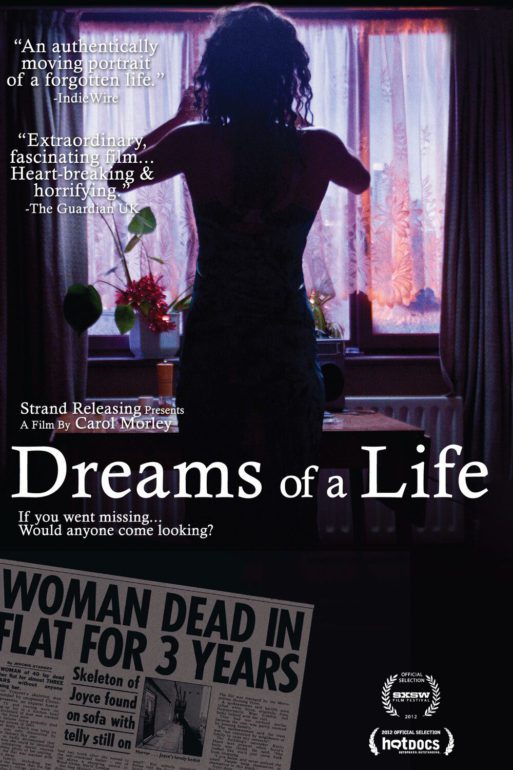 Joyce Vincent was 38 years old when she died in December 2003. Not a single human being noticed that she was gone until January 2006. It was only after bailiffs broke into her London flat to collect years of unpaid rent that her remains were discovered.
Joyce Vincent was 38 years old when she died in December 2003. Not a single human being noticed that she was gone until January 2006. It was only after bailiffs broke into her London flat to collect years of unpaid rent that her remains were discovered.
You might imagine Vincent was a hermit or someone who didn’t care for people much.
What if I told you that a young Joyce Vincent once had dinner with Stevie Wonder? Or that she shook hands with Nelson Mandela? Or that she was acquainted with Gil Scott-Heron?
In fact, Vincent was a budding singer herself, with a bright, vivacious personality that lit up every room she entered.
Carol Morley dives into Joyce Vincent’s life and the confusing circumstances of her death in her documentary Dreams of a Life. She paints a picture of a woman who you would never expect to die alone. Morley does more than this, though. She tells a story of how quickly even the most promising lives can change.
Dreams of a Life is told through the personal accounts of Joyce Vincent’s friends and family. Her entire life rests in the memories of these people as they reminisce about the first time they met Vincent. It’s 38 years of a complicated, deep personality distilled into an hour of sound clips from people viewing it from a distance.
Vincent began life in London with her African father, Indian mother and four older sisters. When she was 11 years old, her mother died after an operation, which left Vincent’s sisters to look after her. Friends say she described her father as distant and not particularly loving.
The only hint her friends could see of her unfortunate future was that she was impossible to pin down.
Despite these hardships, friends say she was an absolute firecracker. She was intelligent, ambitious and stunning. The only hint her friends could see of her unfortunate future was that she was impossible to pin down. She would pack up and move every year or so, change jobs on a whim and cycle through brief flings with attractive men around her.
What made her seem like such a success in life might have contributed to her death. Friends said they never worried when they lost contact with her because they assumed she was off living a new, better dream. She probably had a bigger house, a lucrative career and a handsome boyfriend with a chiseled chin. Why would she call them up on the phone to chit-chat?
They had no idea she had died alone in a flat designated to her through a survivors of domestic violence organization next to a pile of Christmas presents she never got to send.
A woman with a vibrant life doesn’t simply slip into loneliness by accident.
This is where Morley’s film takes a dark turn. A woman with a vibrant life doesn’t simply slip into loneliness by accident. While no one will ever know exactly why Vincent died the way that she did, Morley provides possible answers.
Vincent’s bubbly personality concealed emotional turmoil. She began seeing a man who would control her every move. She became estranged from her loved ones. His abuse continued until Vincent left for a domestic abuse shelter. She lived in a flat that housed survivors of abuse until she died of a suspected asthma attack in 2003.
Perhaps the most tragic aspect of Dreams of a Life is not the fact that this young woman died without anyone noticing. It is that friends and family think she was too afraid and embarrassed to be seen as a domestic abuse survivor. By the end of the film, it makes sense that someone as proud and upwardly-mobile as Vincent would never want to be seen as a victim.
Dreams of a Life tries to answer questions about Joyce Vincent’s strange death, and yet it creates more than it solves. We’re left with gaping holes in the story that only Vincent herself could answer.
It is ironic that in all of Vincent’s pursuits in life, she’s now best remembered for the way she died. In a way, this is a redemption. Although no one noticed her death for three years, I am here now writing about her life, her passions and her dreams. Carol Morley has given Joyce Vincent her life back.
If you or someone you know is in an abusive relationship, call the National Domestic Violence Hotline at 1-800-799-7233. Remember that there is no shame in asking for help.
For more information about programs that provide companionship for people who are dying, read our article here. Take a look at one author’s thoughts about dying alone here, and a list of end-of-life rights and tips here.

 Dreams of a Life by Carol Morley
Dreams of a Life by Carol Morley



 Passing of Beloved Comedian Births a New Comedy Festival
Passing of Beloved Comedian Births a New Comedy Festival

 The Spiritual Symbolism of Cardinals
The Spiritual Symbolism of Cardinals














